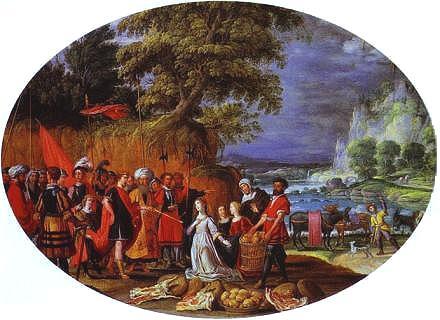Michele Huey's Blog: God, Me, and a Cup of Tea, page 12
October 29, 2022
Travel Travails, Part 2

We live by faith, not by sight. – 2 Corinthians 5:7 (NIV)
If you thought my travel troubles going to Colorado were bad (described in agonizing detail in last week’s column), that wasn’t even half of it. While the trip out took 17 hours, getting home took twice as long, thanks to another snowstorm.
My mood soured even before I left Colorado Springs. Waiting at the gate, I squirmed in my seat, watching the morning’s blue sky disappear and the previous day’s blowing snow return. The time for boarding came, but the plane to Denver still hadn’t arrived. Due to the nearly 4-hour delay and the weather chaos heading east, my flight itinerary was adjusted.
And I’d prayed for two months for good travel weather. I texted my husband, “What good is prayer?”
After an 8-hour wait in Denver, I finally boarded the flight to DC at 1 a.m. Three sleepless hours later, we landed at Dulles, where I waited 12 hours for my flight to Johnstown, and where I acquired a new skill—snoozing in an airport.
The morning stretched into afternoon, and the snow changed to sleet, then rain. I nervously watched the flight information board, expecting this final flight to be delayed like all the others on this trip. But—hooray!—we took off only 45 minutes after we were supposed to. One stop in Altoona, then on to Johnstown. Almost home! However, the light snow in Altoona wasn’t light in Johnstown. The last leg of my troubled trip was cancelled.
But my travails weren’t over. My luggage was missing, and the one of the two taxis summoned to ferry us to Johnstown—the one I was in—almost broke down before we even left Altoona. The driver, however, pushed on, even though the oil pressure gauge and check engine lights warned of impending trouble. Lord, please don’t let the engine blow up. I wasn’t mad at God any longer. I just wanted to get home.
The closer we got to Johnstown, the more the weather deteriorated. Ice pellets rapped against the windows, road cinders hit the doors like a million bullets, and the tires struggled to grip the icy ramp off the four-lane to the airport. Still the driver sped on. Lord, just get us to the airport in one piece.
Within sight of the airport, the taxi in front of us spun out into the deep snow along the bank. Our taxi made it to the airport without incident, and my son came to fetch me, 24 hours later than planned. After a good night’s sleep, I drove home. My luggage arrived that evening.
After all that prayer . . .
Did my travel travails mean God didn’t answer? That He didn’t care? That He really isn’t in control?
What it comes down to is simply faith. And mine faltered. Big time. And that pricked my pride. I’d thought of myself as a person with a rock-solid faith, but when a time of testing came—and an insignificant time of testing at that—I huffed and puffed and acted like a spoiled child not getting her own way.
In her Bible study Living Beyond Yourself, Beth Moore describes two kinds of faith: a roller coaster faith based on what God does, and a rock-solid faith based on what God is.
I know what kind I need. What about you?
When life goes awry, my prayers go unanswered, and Heaven is silent, remind me, Lord, that my faith shouldn’t be in what You do, but in what You are—an unchanging, sovereign God whose grace and love are exceedingly abundantly above all that I can ask or imagine (Ephesians 3:20). Amen.
Read and reflect on Hebrews 11; Isaiah 55:8–9.
From God, Me, & a Cup of Tea: 101 devotional readings to savor during your time with God, © 2017 Michele Huey. All rights reserved.
October 22, 2022
Travel Travails, Part 1

Forgetting the past and looking forward to what lies ahead, I press on to reach the end of the race and receive the heavenly prize for which God, through Jesus Christ, is calling us. —Philippians 3:13,14 NLT
It was a trip like no other. Three flights, three delays. It took seventeen hours to get from Johnstown, Pa., to Manitou Springs, Colo., where I would spend five days with my fiction writing class, learning from the masters. But I had to get there first.
Knowing how fickle western Pennsylvania weather could be in March, although I really thought winter would be well on its way by then, and knowing how unpredictable the airline flight schedules are, I booked my trip in early January for Tuesday, March 19, allowing myself an entire day for travel. I was to leave Johnstown at 6:30 a.m. (Eastern Time) and arrive in Colorado Springs 12:20 p.m. (Mountain Time). The first meeting wasn’t until 6 p.m. Wednesday, giving me time to rest from the trip and stroll the streets of the delightful little town at the base of Pikes Peak.
That was the plan.
Since when do plans go according to plan?
Especially when it comes to airline schedules.
Especially when it comes to weather—in March no less.
Sunday morning before the trip I checked the forecast: A snowstorm was in the offing for the next day. “God, how can you do this to me?” I groaned. “I’ve prayed for good travel weather for two months!”
So I packed and headed for my son’s house in Johnstown a day early to beat the storm. Tuesday morning he dropped me off at the airport, where I waited five hours for the ice to melt off the runway. Because I missed the connecting flight from DC to Denver, the airlines put me on a later flight, which was held up because – get this – a bathroom door on the plane was broken and we couldn’t take off until it was fixed.
“It’s going to be tight,” I texted my husband, referring to the connecting flight in Denver to Colorado Springs.
It was. When I got to Denver, I ran to the gate where I was sure everyone had already boarded. I’d made it! They started boarding within five minutes. But the walk from the terminal to the actual gate where the plane waited was long. I was feeling the effects of the extended travel day and the anxiety that comes with it. When I snapped my seat belt on, I sighed with relief.
Too soon. The captain emerged from the cockpit. We had to deplane. Our broken aircraft had to be replaced. An hour later, I made the long trek back to the gate, my briefcase getting heavier by the second. But it was the wrong gate. I retraced my steps, muttering loudly and regretting my “a time to laugh” t-shirt.
We landed in Colorado Springs a little before 9 p.m., and a not-so-cheap taxi ferried me to my hotel, where I arrived, worse for the wear, nine hours after I was supposed to. A porter relieved me of my luggage and showed me to my room. I stepped in – and gasped in delight: The room came with a gas fireplace, spa tub (which I used that night), king-size bed (which I’d have all to myself), and heated toilet seat!
It was a rough trip, but the destination was worth all the hassle.
Just like life—the journey is filled with delays, hassles, heavy burdens, missed connections, disappointments, and frustrations. Your itinerary is in another’s hands.
But, oh, what’s waiting for you on the other side!
When my steps begin to falter and my attitude gets sour, Lord, remind me of my final stop. Amen.
Read and reflect on Revelation 21:1–22:5.
From God, Me, & a Cup of Tea: 101 devotional readings to savor during your time with God © 2017 Michele Huey. All rights reserved.
October 15, 2022
Treks and Trails
 The view of Fort Ticonderoga from the top of Mount Defiance
The view of Fort Ticonderoga from the top of Mount DefianceHe will not let your foot slip – He who watches over you will not sleep. – Psalm 121:3
To celebrate our fortieth anniversary nine years ago, DH and I took a two-week camping trip through the Northeast. Starting with the Finger Lakes region in New York, we drove through the Adirondacks, the Green Mountains in Vermont, the White Mountains in New Hampshire, and then up the coast of Maine to Acadia National Park.
When we weren’t on the road, I’d planned for our vacation to be a time of resting and recharging.
I should have known better than to think Dean would be content to sit around relaxing. Every day he was anxious to be out the door as soon as breakfast was over. We put 450 exploring miles on our truck and I don’t know how many on our feet.
The first trail we hiked was the ¾-mile Gorge Trail in New York’s Taughannock State Park – a level, gravel-topped track that ran parallel to the Taughannock Creek and led to the 215-foot waterfall of the same name.
“I can do this!” I thought as I stepped along, stopping to read every placard along the trail, feeling proud of myself because I was really pretty much out of shape.
The next trek was up the one-mile paved road to the summit of Mount Defiance in Ticonderoga, New York. We’d spent the day exploring the fort, and all I could think of was getting back to the camper and propping up my aching feet. But when we got to the road to the summit, the gates were closed.
 Celebrating the climb
Celebrating the climb“I can do this!” I told Dean when he said we’d have to walk. Somehow I got my second wind. And third . . . and fourth . . . it took 36 minutes to reach the summit – 25 walking minutes and 11 stopping minutes for me to catch my breath. There were places where we ascended a foot with each step. But the view at the top was worth every gasp.
When we reached Acadia National Park in Maine, 120 miles of trails ranging in difficulty from “very easy” to “strenuous” wound through Mount Desert (pronounced “dessert”) Island. The walking wasn’t easy. The coastline is rocky, the mountains granite, and the trails comprised of roots and rocks to step over, between, on (and trip on) – and boulders to climb.
 Rocky, root-embedded trails of Acadia National Park
Rocky, root-embedded trails of Acadia National ParkThe Ship Harbor Trail was rated easy. Right. We stopped on the way back to the campground to buy a box of Epsom salts.
“I need hiking shoes,” I told Dean while my feet were soaking. “These sneakers are for walking nut hiking.”
The Beech Mountain Trail, the last one we hiked, looked easy at first – soft, smooth, brown forest floor. Then we came to a marker. The left trail was .4 mile; the right was .7 mile. Since we were pressed for time, I chose the shorter trail.
But shorter doesn’t mean easier or quicker. The smooth forest floor soon changed to roots, rocks, and boulders.
“I can do this!” I said, when still another boulder presented itself. Envisioning the view from the top kept me stepping along, as well as Dean’s hand sometimes dragging me along. “I’ve come this far . . .”
It took us 50 minutes to reach the summit and 30 minutes to walk the .7 mile trail down off the mountain.
All the trails we hiked weren’t so challenging. There were sections that wound through pine trees along a soft forest floor, where I didn’t need Dean’s hand for balance or support – or to drag me over the places I didn’t think I could traverse.
The trails of life are the same: they range in difficulty from very easy to strenuous to “I don’t think I can make it!”
But we can make it. It just takes a vision of the view from the top, a hand to help us along, and lots of “second winds.”
 I made it to the top!
I made it to the top!Birch Mountain, Acadia National Park, Sept. 26, 2013
Thank you, Lord, for Your guiding hand that gives me balance, support, strength – and pulls me through the tough places when I don’t think I could take one more step. Amen.
Read and reflect on Psalm 121.
From God, Me & a Cup of Tea: 101 devotional readings to savor during your time with God, © 2017 Michele Huey.
October 8, 2022
Moonflower Faith
I have fought the good fight. I have finished the race. I have kept the faith. – 1 Timothy 4:7 NIV
I’d never heard of moonflowers until a friend posted a picture of hers on Facebook. “The blossoms bloom only at night,” she wrote.
Flowers that bloom only in the dark? Intrigued, I did some online research.
Moonflower vines, I learned, can grow up to 20 feet, with 4-to-6-inch white, fragrant blossoms opening in the evening until the following morning.
How like faith—genuine, real, rubber-meets-the-road faith. Faith, I’ve learned, is only faith when you can’t see. When you’re in the dark, not knowing, not in control. When you have no one else to turn to but God.
Have you ever known anyone who possesses such a faith? I did.
To say that Louise was a joyful person was an understatement. Joy bubbled out of her. I rarely saw her without her bright smile and sparkling eyes—and sense of humor. Situations that would give me permission to wallow in self-pity, she managed to find the light side. Like the time she came to church sporting a black eye, caused by the recoil from her hunting rifle. The church pianist, she sat at the keyboard on the platform, laughing as she told us the story.
Louise and her husband, Carl, once led an active, busy life, led by their love for their family, their church, and their Lord. Blessed with musical talent, they often sang together, visiting numerous churches in the area. They produced cassette tapes, offering them for a donation to cover the cost of production.
When Louise was diagnosed with cancer, Carl was chronically ill himself. Since she could no longer take care of him, he went to live in a local nursing home.
Wanting to offer back some of the comfort she’d always given me, I made a batch of chicken soup and took it to her. But she was the one who ministered to me.
“When I woke up this morning,” she said as we sat at her kitchen table, “before I even got out of bed, I lay there, just praising God.”
 Photo courtesy of Louise Tucker Jones
Photo courtesy of Louise Tucker JonesLouise lived the words she once sang: “You talk of faith when you’re up on the mountain. Talk comes easy when life’s at its best. But it’s down in the valley of trials and temptations, that’s when faith is really put to the test. The God on the mountain is still God in the valley. When things go wrong, He’ll make it right. And the God of the good times is still God in the bad times. The God of the day is still God in the night.”*
Shortly before she passed away, a month before Carl, I saw some pictures of Louise on Facebook. Her thin frame and head turban told of the battle she waged. But her bright eyes and smile that lit up her whole face told another story—a story of a moonflower faith, its beauty opening to the dark, exuding an unforgettable fragrance into the world around it.
O God, may my faith, too, be a moonflower faith. Amen.
Read and reflect on Hebrews 11.
*From the song, “God on the Mountain” by Tracy Dartt.
© 2019 Michele Huey. All rights reserved.
October 1, 2022
Mowing Down the Fields

The more you grow like this, the more you will become productive and useful in your knowledge of our Lord Jesus Christ. —2 Peter 1:8 NLT
Every year my husband got the old tractor out of the barn, sharpened the blades on the mower, and took the time to cut what used to be productive hayfields. Forty years ago, they yielded hundreds of bales.
But no more. Over time, the hay thinned out because no one was farming the land anymore, so the soil wasn’t cultivated. But he didn’t want the fields to grow wild, allowing unwanted trees, shrubs, and bushes to take over. Left untended, the fields will go back to their natural state. If we ever want the land to be productive again, we’d have to add lime and fertilizer to the soil.
Those fields are a reminder of what I’m like when I neglect the disciplines that foster healthy spiritual growth. Bushes of bad habits, shrubs of subtle sins, saplings of selfishness spring up when I don’t take time to mow them down through prayer and Bible reading. In the light of God’s Word, I examine my life, confess the sins God reveals to me, and ask Him to help me mow them down and keep my spiritual fields free from unwanted growth. Left untended, I’d go back to my natural state, where my sin nature reigns.
But simply cutting down unwanted growth isn’t enough. Like our fallow hay fields, my life would be unproductive without extra work.
God has given us all we need to live a godly life, but we have to invest our own time and effort to become productive by adding to our faith, virtue, knowledge, self-control, steadfastness, godliness, brotherly affection, and love.
“Do this,” God tells us, “and you will never stumble or fall away” (2 Peter 1:10).
Indeed, He promises the very gates of heaven will swing open wide.
Dear Lord, forgive me when I neglect my fields. Help me to be diligent and steadfast so that I can be productive for You. Amen.
Read and reflect on 2 Peter 1:3–10.
From God, Me, & a Cup of Tea: 101 devotional readings to savor during your time with God, © 2017 Michele Huey. All rights reserved.
Image created by Paulette Johnson/Fox Hill Photo, from “How to Restore a Hayfield to Full Production,” by Daniel Johnson, Hobby Farms
September 24, 2022
Staying with the Stuff

Soldiers who stay behind to guard the camp get as much as those who go into battle. – 1 Samuel 30:24 (CEV)
Life can turn on a dime.
David, better than anyone, knew this.
In today’s reading, he and his men have returned from battle to discover Ziklag, where they’d settled with their families, burned to the ground, and everyone—women, children young, and old—taken captive, including David’s family. David’s men blamed him for their loss.
“But David found strength in the LORD his God” (1 Samuel 30:6).
“Shall I chase after this band of raiders?” he prayed.
“Yes,” God told him. “You will surely recover everything that was taken from you.”
Somehow David convinced his men, who were talking of stoning him, to join him in his pursuit. However, 200 of the 600 men who set out stayed behind, too exhausted to go on. David and his warriors surprised the enemy, recovered everything that had been taken, and came home with a sizable plunder purse.
Which they didn’t want to share with the 200 who hadn’t gone along.
“No, my brothers,” David said. “Don’t be selfish with what the LORD has given. He has kept us safe and helped us defeat the band of raiders that attacked us. Who will listen when you talk like this? We will share and share alike—those who go into battle and those who guard the equipment.”
I like the way the King James Version phrases that last statement: “so shall his part be that tarrieth by the stuff.”
Have you ever had to “tarry by the stuff” because you were too exhausted to go on, or because someone had to take care of things back home?
One evening nine years ago during baseball practice, my 14-year-old grandson Brent suffered a compound fracture of the bone in his upper left arm in a violent collision with another player in center field. An ambulance transported him to Children’s Hospital in Pittsburgh, where he underwent surgery the next morning. His parents spent the next three days with him in Pittsburgh.
Meanwhile, back at the ranch, Grandpa and I “tarried with the stuff” – two grandchildren, ages 6 and 10; Zoey, their 4-month-old Dogo Argentino; a couple dozen chickens, a goat, and a horse. We weren’t able to physically be with our loved ones during this crisis. But someone had to maintain the home front and what better someone than we who lived next door?
As I pondered my role during my quiet time that week, 1 Samuel 30:24 came to mind. Both those who go forth to deal with the emergency and those who stay behind to guard the stuff have vital jobs in the battle of life. I not only got to spend precious time with my grandchildren and my “grand-dog,” bonding more with them, but also I was able to have Brent’s favorite meal waiting for them when they got home.
Crises hit all of us. Sometimes it’s your job to go forth and fight. But if your role is to “stay with the stuff,” remember it’s just as important to guard the home front – with love, action, and prayer.
Thank you, Lord, that we can find strength in You and turn to You for wisdom during crisis times, whether we go forth or stay with the stuff. Amen.
Read and reflect on 1 Samuel 30.
From God, Me, & a Cup of Tea: 101 devotional readings to savor during your time with God, © 2017 Michele Huey. All rights reserved.
September 17, 2022
What Kind of Flower Are You?

Let your hope keep you joyful, be patient in your troubles, and pray at all times. — Romans 12:12 TEV–
My husband and I were at our church’s annual sweetheart dinner, and the men were taking a how-well-do-you-know-your-wife quiz. “What is your wife’s favorite flower?” was one of the questions. He wrote “roses.”
Roses are nice, but they’re not my favorite flower. I tried to come up with my own answer to the question, but the truth was I didn’t have a favorite flower. I didn’t know I was supposed to. I like all flowers, especially wild ones.
I didn’t give the favorite-flower question much thought until years later.
“I just love lilacs,” I told DH one day as we sat at the dining room table, the fragrance of lilacs filling the room. “They’re my favorite flower.”
But I had to qualify that.
“For fragrance, that is,” I added. “I like carnations because you can put them in water, and they last for weeks. And I like daisies because they’re such a happy flower.”

“You know,” I continued, “I want to be like those three flowers: fragrant like the lilacs, hardy like the carnation, and happy like the daisy.”
The more I thought about it, the more I realized those three flowers also symbolize my faith.
The lilac symbolizes my prayer life. Just as the lilac’s soft fragrance continually fills the air around it, so should my prayers ascend to God like the Old Testament sacrifices described as a “pleasing aroma,” a “sweet-smelling savor,” or a “fragrant offering” to the Lord. As I love to stand next to my lilac bush when it’s covered with blossoms, inhaling the heady scent, so I imagine God inhaling the sweet scent of my prayer offerings to Him.
The carnation symbolizes endurance. Hardy, even for black-thumbed me, the carnation doesn’t need babied. But too often I’m like the rose—I want to be beautiful for God, but I have to be pampered if I’m to last. When life’s circumstances heat up, I whine, pout, and wilt. The Christian life isn’t a flower shop, where perfect conditions are cultivated for the flowers to thrive. It’s more like the world outside, where weather conditions can change in a moment, and endurance is necessary if I’m to thrive for God.

Finally, for me, the daisy symbolizes the joy that comes from hope. Such a little word and so often dwarfed next to its giant big brother faith, hope is my song in the night. It’s what keeps me going in the tough times, what keeps me putting one step in front of the other on this long, hard journey called life. Hope in my heart is what puts the smile on my face. Hope is knowing that although there may be tears in the night, joy will come with the morning light. And morning always comes.
Lord, help me to be fragrant like the lilac, hardy like the carnation, and happy like the daisy. Amen.
MORE TEA: Read and reflect on Romans 12.
From God, Me, & a Cup of Tea: 101 devotional readings to savor during your time with God © 2017 Michele Huey. All rights reserved.
Images courtesy of Pixabay.com. Free for commercial use. No attribution required.
September 10, 2022
Slim Pickings

“Here is a boy here with five small barley loaves and two small fish, but how far will they go among so many?” – John 6:9 (NIV)
He was one of the children among the crowd following Jesus that day. He carried with him five small barley loaves and two tiny fish, perhaps packed by his mother when he left that morning. When Jesus eyed the throng, He turned to Philip. “Where are we going to buy bread for all these people?”
“Eight months’ wages wouldn’t buy enough for everyone to have even a bite!” Philip answered. It was Philip, remember, who later asked Jesus to “Show us the Father, and we’ll be satisfied,” to which Jesus replied, “You’ve been with Me all this time, Philip, and you still don’t know Me? Anyone who has seen Me has seen the Father!” Poor, blind Philip.
It was Andrew who volunteered the lad’s lunch. He, too, didn’t see the potential, didn’t connect the dots, after all Jesus’ miracles he’d witnessed: “But how will five small barley loaves and two small fish feed 15,000 people?”
You know the rest of the story—the multitude was fed and the leftovers filled 12 baskets!
But what if the boy had refused to donate his munchies? The obvious answer is the people would have had to get something to eat themselves. The less noticeable answer is that a blessing—a huge blessing, a blow-your-mind, knock-your-socks-off kind of blessing—would have been missed.
The lad didn’t lose anything, didn’t give anything up, really. He, too, ate until he was full—of the small offering he gave to Jesus, who had the power to transform “not enough” into “more than enough.”
Sometimes we think what we have to offer Jesus is slim pickings. How could it possibly make a difference?
Ah, therein lies the test!
Give Him all you have, no matter how small you think it is. Let it go, completely, all of it, like the little boy who held back none of his lunch. And watch God take what you give and multiply it so that it blesses more people than you could have imagined.
Remember the words of Martin Luther: “I have held many things in my hands, and I have lost them all; but whatever I have placed in God’s hands, that I still possess.”
I think of authors who have had many of their books and articles published, of speakers who take their messages the world over. I compare myself with them. And I feel so . . . little.
Shame on me. I’m blind like Philip and skeptical like Andrew, who no doubt thought he was being practical.
Shame on me. I need to be more like the little boy who gave up his lunch—and trust that what I think is slim pickings, in the hands of God, will be multiplied many times over, work more miracles than I could ever have dreamed possible—and come back to bless me, too.
Forgive me, Lord, for doubting what I have to offer could ever be enough to make a difference. Remind me that, in Your hands, little is much! Amen.
Read and reflect on: John 6:3–13.
From God, Me, & a Cup of Tea: 101 devotional readings to savor during your time with God © 2017 Michele Huey. All rights reserved.
September 3, 2022
Work: Blessing or Curse?
 Image courtesy of Creative Commons. No attribution required.
Image courtesy of Creative Commons. No attribution required.Whatever you do, work heartily, as for the Lord and not for men. –Colossians 3:23
It was 25 years ago. The door had firmly shut on the job of my dreams –teaching – and, after I got over my major, extended funk, I realized this was an opportunity to pursue another one of my life’s interests – writing.
So I got a job at a local newspaper writing feature articles.
I loved it! I wrote human interest stories with a positive slant. Interviewing folks fascinated me, their stories intrigued me. I had the best of both worlds: a job I loved and freedom to set my schedule and choose my topics. But I was too stupid to see it. I wanted a position on staff, not be merely a stringer.
So when the society page editor resigned, I stepped into her position. I didn’t like it as much as writing people stories, but I was caught in a “climb-the-ladder-to-success” scenario. Excuse me, trap is a better word.
Fast forward a year or so, and I found myself in the editor’s office. Editor of the entire newspaper. I hated it. I hated the hours. I hated the politics. I hated everything about it.
In his book If You Want to Walk on Water, You’ve Got to Get Out of the Boat, John Ortberg tells the story of a man who was offered the presidency of a university. A Quaker, he called together a half-dozen Quaker friends to help him discern whether this was truly a calling from God.
When asked what he would like about being president, he told them all he wouldn’t like. Finally, when asked a third time, he came face to face with the real reason he even was considering it: “Well, I guess what I’d like most is getting my picture in the paper with the word president under it.”
“Parker,” one man asked, “can you think of an easier way to get your picture in the paper?”
We can laugh, but that’s where I was. I liked the words “editor of the newspaper” behind my name, but there was no joy. I was absolutely, totally miserable. The mother of miserable.
Fortunately, I didn’t last long. I went to another newspaper, where I continued to write my devotional column, plus another column about my former town and also covered board meetings.
My sister’s death in 2003 made me realize I still wasn’t fulfilling my God-given calling. I was letting money and prestige dictate my job choices.
When you’re fulfilling God’s purpose for you (see Psalm 138:8), joy will fill you. Your work will be a blessing. But when you’re out of sync with that calling, uneasiness, restlessness, joylessness, and even downright misery will rule the day. Work will be a curse.
It takes courage to step out of the rut we’ve carved for ourselves, take off the masks, and leave the comfort of the known.
But remember, God has a plan for your life (Jeremiah 29:11), and He will guide you, direct you, prepare the way for you, walk with you, go before you, and provide for all you need.
Commit your way to the Lord, and your plans will be established. He will make your steps firm (Proverbs 16:3 and Psalm 37:23–24). In all your ways, acknowledge Him and He will direct your path (Proverbs 3:5–6).
Why not ask God what He wants you to be doing? His answer may surprise you – and will definitely delight you.
Thank You, God, for giving me satisfying work that uses the talents You gave me, fills me with joy, and fulfills Your purpose for me. Amen.
Read and meditate on Matthew 25:14–30.
© 2018 Michele Huey. All rights reserved.
August 27, 2022
Water of Life

As the deer pants for streams of water, so my soul pants for you, O God. My soul thirsts for God, for the living God. — Psalm 42:1–2 NIV
After three trips to Colorado Springs, elevation 6,035 feet above sea level, I learned to drink a lot of water.
The first time I went in the winter, and the air was dryer than at other times of the year. My eyes burned for the entire writers’ conference. Just walking from my classroom to an editor’s appointment left me gasping for breath. Now when I’m in Colorado Springs, I carry eye drops, pace myself when walking, and drink at least sixty-four ounces of water a day.
Sixty-four ounces is a lot of water, you say. At that altitude, the air is thin and dry. Thin, meaning less oxygen than I’m used to breathing here at home in Smithport, Pennsylvania, elevation about 1,800 feet. So to get the oxygen I need, I’m taking more breaths.
The higher altitude also means lower air pressure, which causes moisture to be snatched away from my skin and sucked from my lungs with each breath faster than here at home. And since Colorado Springs ranks thirty-third in the top 101 U.S. cities with the lowest average humidity—at 51.9 percent—I’m not getting a whole lot of moisture in the air I breathe.
At six thousand feet above sea level, a person exhales and perspires twice as much as at sea level. This can make a difference of a quart or more of water a day. Whether or not I realize it, when I’m in Colorado Springs, I’m breathing more, perspiring more, and losing more body water. And if I don’t drink enough water, I’m going to get dehydrated.
The funny thing about dehydration is that, unless you know the effects of high altitude on the body, you don’t even realize what’s happening and pass off the headache, fatigue, shortness of breath, dizziness, and nausea as a bug or travel lag. Folks have been known to collapse and be rushed to the hospital, where they were back to normal after receiving much-needed water.
Just as my body needs water, my soul needs God.
Jesus illustrated our need for Him when He told the Samaritan woman at the village well, “Everyone who drinks this water will be thirsty again, but whoever drinks of the water I give him will never thirst” (John 4:13—14).
When I take time to drink of the water He offers—by spending time talking to Him, listening to Him, and reading and meditating on His Word—my flagging, life-dried spirit is refreshed and revived. When I need rest, He leads me to green pastures and quiet waters. When trouble abounds, He’s right there with His rod and staff. When the way is dark and fearsome, He guides and comforts.
Are you spiritually dehydrated? There’s plenty of water to refresh and revive your soul. All you have to do is come.
O God, you are my God, earnestly I seek you; my soul thirsts for you . . . in a dry and weary land where there is no water (Psalm 63:1 NIV). Amen.
MORE TEA: Read and reflect on Psalm 23 and John 4:6–14.
*http://www.highaltitudelife.com/dehydration.htm
From God, Me, & a Cup of Tea: 101 devotional readings to savor during your time with God © 2017 Michele Huey. All rights reserved.
God, Me, and a Cup of Tea
- Michele Huey's profile
- 19 followers



